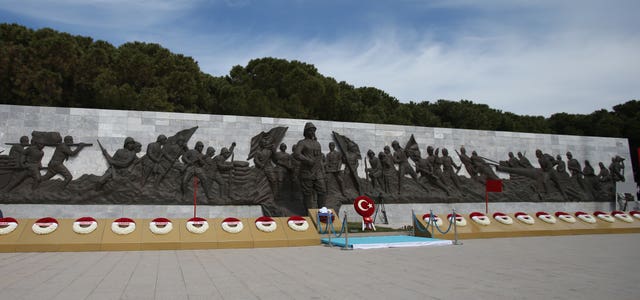
Australia and Australians answered the call of the Empire emphatically when the fighting began in the First World War – including Aboriginal men who were denied citizenship of the land they called home.
The contribution of Aboriginal and Torres Strait Islander soldiers is unclear, owing to the fact that race was often not recorded on enlistment forms.
But independent researcher and historian Philippa Scarlett has sought to change this, spending decades uncovering stories of those who became so-called forgotten diggers.
 Australian forces – including Aboriginals – took part in the Battle of Gallipoli (Niall Carson/PA)
Australian forces – including Aboriginals – took part in the Battle of Gallipoli (Niall Carson/PA)
She said: “As a white Australian, I just had no idea as many people did in the 1990s, that Aboriginal people served in any of Australia’s conflicts.
“When they came back, Aboriginal soldiers were quite often not recognised and missed off war memorials.”
More than 1,000 Aboriginal men attempted to enlist, with 820 serving in the AIF between 1914 and 1918 including at Gallipoli, Light Horse in Egypt and the Australian Tunnelling Company on the Western Front, Ms Scarlett said.
The Defence Act at the time prevented anyone who was not of mostly European descent from serving, but many Aboriginal men found their way in.
Some claimed they were from the south of Europe, others travelled to a second centre after being refused by a recruiting officer elsewhere.
Ms Scarlett, who works with the mission records of the AIF, said there was a “paradox” with Aboriginal men volunteering when the country refused to grant them citizenship, and would not until 1967.
She said: “Why would they fight for the people who were the imperialists? It is very hard to understand, but some people say they just joined up following very aggressive recruitment campaigns.
“It’s hard to know because we don’t have any written records, but I think there were a few who were fighting for their country. Australia was their country, although it had been taken from them.
“They went into the war, just like other soldiers, and some came home injured, some didn’t come home, they were traumatised, injured.
“These men went, their country did not recognise them, and when they came home there were so many rights they didn’t have. They were treated like second-class citizens.”
A number of Aboriginal soldiers had hopes of greater equality after the war.
But Thomas Blackman, writing to anthropologist Caroline Tennant-Kelly in 1935, said: “I always thought that fighting for our king and country would make me naturalised British subject and a man with freedom in the country but I have hardly had freedom since I returned from the war; I have no justice at all.”
Aboriginal soldiers were also decorated for their war efforts, four receiving Distinguished Conduct Medals and one, Ewan Rose, being awarded the Belgian Croix de Guerre.
His recommendation, from Captain Robert Thomas Brock, spoke of Corporal Rose’s “courage and cheerfulness” as he extracted colleagues at Broodseinde Ridge.
Ms Scarlett said it was only in recent years that the efforts of native people had been brought into public consciousness, adding: “I think that’s important.
“At last, during this 14-18 period, that Aboriginal people are being put into the mainstream history.”
Read more about Armistice 100
- Caring for wounded soldiers and force-feeding suffragettes: two sides of the First World War
- WW1 sweetheart shattered by fiance's death ... yet her love endured for 55 years
- Like father, like son: Heroes were badly wounded in world wars
- Keith Bruce: The amazing artworks that are marking the First World War centenary
- Will poppies wilt as Scotland's military family shrinks?




Why are you making commenting on The Herald only available to subscribers?
It should have been a safe space for informed debate, somewhere for readers to discuss issues around the biggest stories of the day, but all too often the below the line comments on most websites have become bogged down by off-topic discussions and abuse.
heraldscotland.com is tackling this problem by allowing only subscribers to comment.
We are doing this to improve the experience for our loyal readers and we believe it will reduce the ability of trolls and troublemakers, who occasionally find their way onto our site, to abuse our journalists and readers. We also hope it will help the comments section fulfil its promise as a part of Scotland's conversation with itself.
We are lucky at The Herald. We are read by an informed, educated readership who can add their knowledge and insights to our stories.
That is invaluable.
We are making the subscriber-only change to support our valued readers, who tell us they don't want the site cluttered up with irrelevant comments, untruths and abuse.
In the past, the journalist’s job was to collect and distribute information to the audience. Technology means that readers can shape a discussion. We look forward to hearing from you on heraldscotland.com
Comments & Moderation
Readers’ comments: You are personally liable for the content of any comments you upload to this website, so please act responsibly. We do not pre-moderate or monitor readers’ comments appearing on our websites, but we do post-moderate in response to complaints we receive or otherwise when a potential problem comes to our attention. You can make a complaint by using the ‘report this post’ link . We may then apply our discretion under the user terms to amend or delete comments.
Post moderation is undertaken full-time 9am-6pm on weekdays, and on a part-time basis outwith those hours.
Read the rules hereLast Updated:
Report this comment Cancel